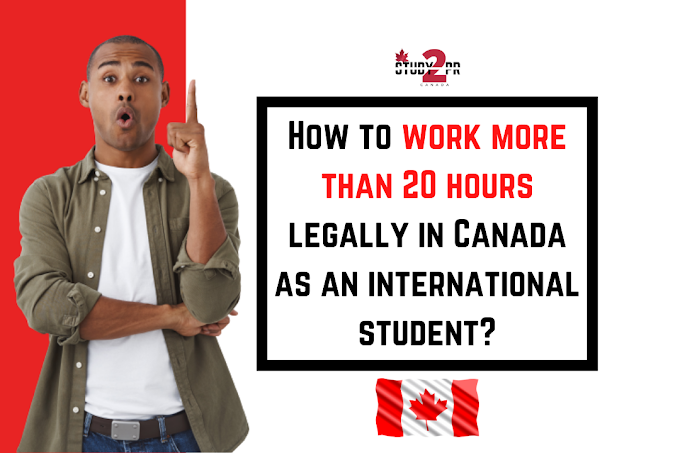What to choose University or College in Canada?
When you plan to study abroad, you go through hundreds of blogs to get to know every single thing. Of course, it needs proper research to keep you on a safe journey to study abroad. When it comes to Canada, you must be stuck between college and university terms. If you are, keep reading; you will definitely get authentic guidance.
Firstly, the Canadian education system is not much different from other countries, but still, you need to know a few things about it as, after all, you are going to have an academic career there.
So, its education system is divided into four levels: pre-school, primary, and post-secondary or secondary education. Secondary education is where the college and university system occurs, which is the thing that you are looking for. We will clear this confusion in steps so that you don't need to go through lots of web pages after this blog.
Most people think that colleges and universities are the same, as both words are used interchangeably in many countries. But, here in Canada, both are used for different academic aspects.
Let's first see the difference between colleges and universities in Canada.
What's the difference between a college and a university in Canada?
The Ontario Ministry of Training itself has explained these two terms. According to it, colleges and universities are both parts of post-secondary education. However, colleges offer the programs that lead to a working career, while universities provide the academic programs that lead to a professional educational career.
Both offer a wide variety of courses. Universities provide postgraduate and undergraduate programs. On the other hand, colleges offer diplomas, certification courses, and undergraduate degrees too.
For your guidance, 24 colleges offer programs in applied arts and technology in Ontario, and there are 19 public universities. You can go through each individually to better understand what they are offering and how they work.
Hopefully, now it's clear to you what college and university mean to the Canadian education system. If you are still confused, let's have a look at the examples below.
For instance, if you are looking for a nursing career in Canada, it's pretty simple that you can pursue diploma or certification courses in nursing that will give you a way to a nursing career. Mostly, the diploma program lasts two to three years, while the graduate degree program lasts four years.
Now that you know the difference, let's get to the focus of this article.
What should you choose?
Before going any further, the decision is entirely up to you. Although you can have an idea after knowing the aspects of colleges and universities, you should still pick one that fits your future and present situation. This article is going to help you make an easy decision.
First, you should keep your education as a priority. You know, colleges offer diploma programs that are, of course, highly valuable, and professional, but still think before choosing a diploma program.
To make a better decision, you should see what you will be studying in college and at university. As was mentioned earlier, colleges provide diploma programs. These are categorized into three stages. The first one is simply a one-year diploma or certified course. The second one is a two-year diploma, while the third one is an advanced diploma that runs for three years. These programs include practical work mostly.
On the other hand, universities are exactly as professional as you think. They offer four-year undergraduate degrees and have a proper education outline throughout the four-year program. You will interact with the highly reputable professors there and will have to go through the books mostly. If you are looking for professional studies and have a higher academic plan in your mind, then you should go to university. And if you are looking for a career in the working field, then college is best.
Factors to Consider When Choosing a College or University in Canada
- Scholarships: You should know as an international student that Canadian colleges have fewer scholarships to offer than the universities do. So, it's an important factor to consider.
- Cost: When it comes to fees, most Canadian universities are higher than American colleges.
- Credit hours: Since the study patterns are different in both, the credit hours are also not similar. You will have to spend more time in colleges to study, while universities have fewer. Thus, if you are not planning to stay in classes most of the time, the colleges might not be a suitable option for you. Secondly, colleges have classes mostly 5 days a week. On the other hand, universities provide 2 or 3 days of classes a week.
- Part-time job: As working while studying in Canada is the dream of most students, you should know that choosing a college or university doesn't impact it. International students can work up to 20 hours per week with or without a work permit, according to foreign law, so universities and colleges don't have anything to do with it.
- Students Visa: College students receive a study visa until the end of their course, whereas university students receive an additional 4-6 months of a study permit in addition to their course duration.
- Degree/Certificate: Canadian colleges don't provide degrees; they only provide certificate courses. That means if you get passed out of any Canadian college, you will be bound to receive an expert certificate for that particular course. Whereas universities provide degrees for any professional course,
Many students think that both terms are the same and provide the degree, but hopefully, it's clear to you now. Overall, when it comes to choosing between a university or a college, you should not overwhelm yourself and choose what best fits your planned study career. Also, exploring both can give you the best explanation. Choose one that offers a course you are looking for and has an affordable process for international students.
My Opinion
Let me tell you an actual scenario that students face in Canada after arriving with either college or university admissions.
College
When a student comes to Canada with admissions to colleges, they are bound to attend classes at least 4-5 days a week. They don't get enough time to work part-time jobs, and because of that, sometimes it becomes an anxious situation. Students feel more tired or find it difficult to do a job during the study period.
However, it is not that difficult as it sounds. Employers in Canada understand the situations of students and provide jobs according to their availability, and students work accordingly.
So, if you are having a financial problem or if you are coming with a student loan then you need to be prepared with all these hard-working conditions. Although it's not impossible, students do it.
University
When a student comes to Canada with admissions to universities, they need to attend classes for 2-3 days a week, which makes them available to work the rest of the time and earn some extra bucks. If you have any financial limitations, then you can work more efficiently and make some money to pay your debts or tuition fees. Sometimes students do a cash job to fulfill their tuition fee requirements.
University base courses are professional courses, so they give you ample time for yourself to get prepared for the subjects and gain expertise.
I hope now all your doubts about the difference between colleges and universities are clear. If you still have any doubts, please let me know in the comments.






0 Comments